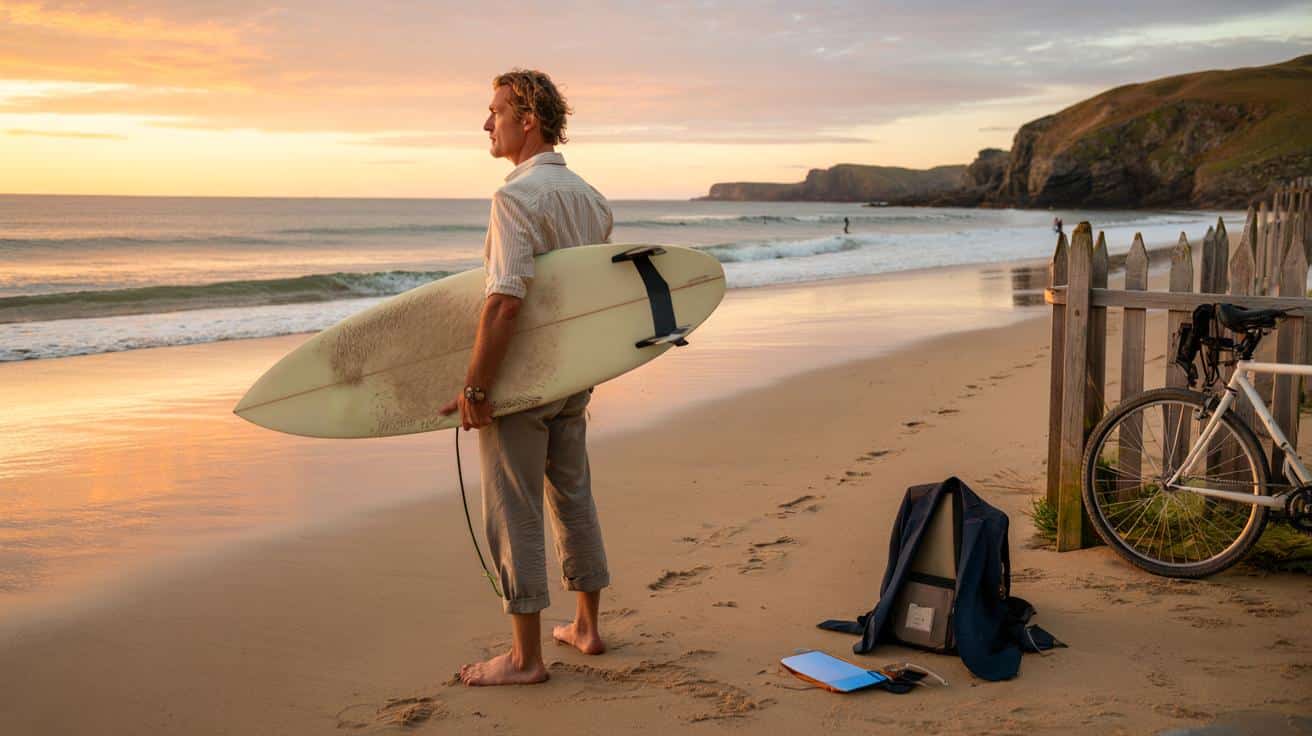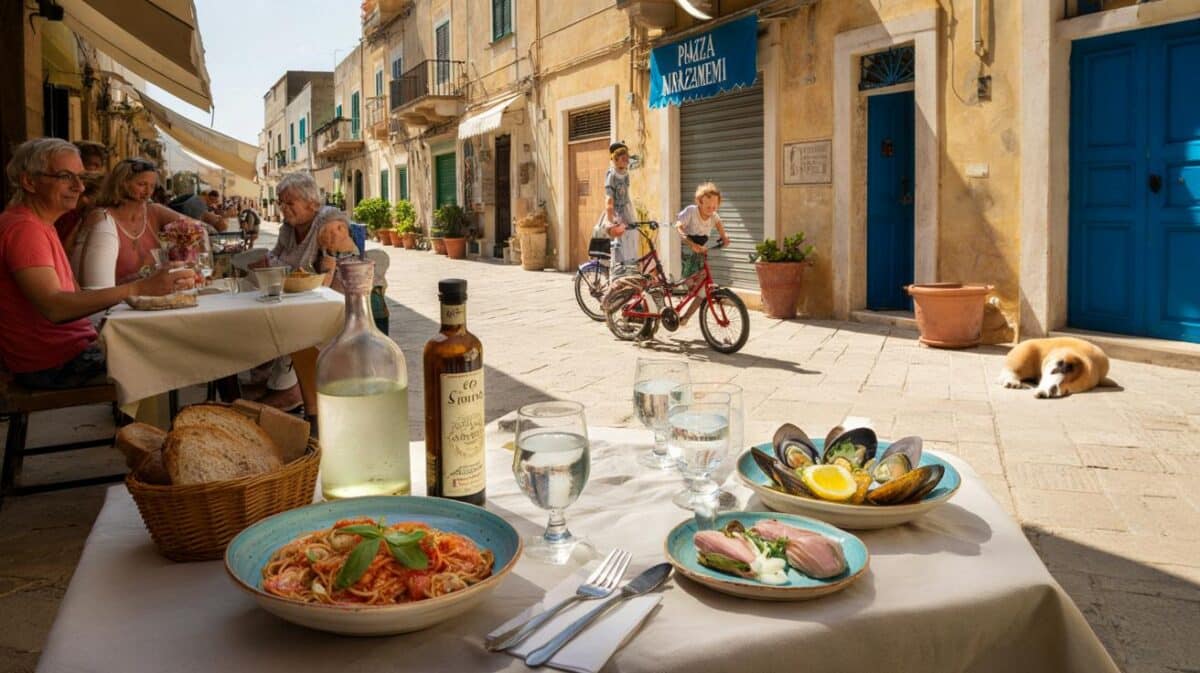Now he measures them in tide times. One man quit a promising City career for a life bathed in late light and salt air — and he swears he’s never been calmer, clearer, or more alive. Is this escape fantasy, or a smarter kind of work?
The evening comes on like a soft hush along the Cornish coast, and Tom Lewis stands with bare feet in cool sand, watching a streak of orange dissolve into the water. The sea is glass-flat. His phone is face-down in his backpack, notifications silenced. A week ago, at this exact hour, he was bent over a laptop in a strip-lit office by Liverpool Street, squinting at a misaligned cell that had crashed a model. Now he earns less money, finishes earlier, and speaks to strangers about the swell. He doesn’t miss the spreadsheets. Not one bit. He misses the feeling he thought they bought him.
From boardroom glow to golden hour
He tells me it wasn’t dramatic at first. It was a series of small stomach flips — a missed sunrise here, a delayed holiday there, the standing half-lunch on a patch of pavement where the wind made his eyes water. He began to notice the light outside his office windows at 4.36pm, how it slid across glass towers, then fell away before he’d seen it. The thought came quietly and refused to leave: life was happening somewhere else, and it didn’t pause while he balanced a workbook.
The snap came on a Wednesday he still remembers by its coffee stain. He sent a 5.12am email to his boss and stepped out for a walk that didn’t end at the Tube. Two weeks later, he moved to Newquay with a shoebox of clothes and a cheap second-hand bike. He took a part-time job at a surf school and a remote bookkeeping contract that covered rent. ONS data shows job churn and career pivots surged post-2021; Tom became one of those headcount blips, a statistic with sandy hair and cleaner lungs.
He insists this isn’t about laziness or throwing a tantrum at a spreadsheet. It’s about energy and where it goes. In the City, energy spun inside closed rooms and long decks that died in someone’s inbox. Here, it moves outwards: he teaches beginners to stand, he fixes old boards, he knows the names of three dogs that patrol the beach. He realised he wanted his work to be the thing that pays for the life, not the life itself. That difference, once seen, had a gravity he could not ignore.
How he made the leap without wrecking his finances
He built a runway, not a springboard. Over six months, he quietly stacked a £9,000 cushion — rent, food, travel, council tax — then added two months for bad weather and boring surprises. He practiced living on the smaller number while still on his old salary, sending the surplus to a separate account he called “Sunset”. He priced his bookkeeping by project, not hour, and found one client before he resigned. He shrank his life: cheaper flat, no takeaways for a while, swapped the gym for a hill and a kettlebell. The maths wasn’t romantic. It was precise.
He also tested the fantasy before committing. He took Friday trains to the coast for four weekends and asked locals nosy questions about winter work. He tried guiding beginners in a stormy drizzle and discovered he actually liked it. He tracked the boring bits like insurance, storage, and repairs. We’ve all had that moment when a dream looks perfect from far away and messy up close; he wanted the mess. Let’s be honest: nobody actually does a complete life overhaul in one clean, cinematic moment.
The pitfalls were human, not just financial. He feared status loss the most — the small things that puff us up, job titles and office views, the way a lift lobby makes a person feel taller. He says you can’t outthink that feeling; you have to live through it until it gets boring. Then routine takes over and your nervous system stops ringing. He called his parents before he quit, told three friends, and wrote down the worst-case scenario on a notebook page. The page looked smaller than his fear, which helped.
“The hardest part wasn’t saying I wanted sunsets. It was admitting I was done with the version of me who only chased the next role. Once I said that out loud, the rest felt like admin.”
- Build a realistic cash runway: 6–9 months of living costs, plus a 15% drizzle buffer.
- Line up one concrete income stream before you go.
- Test the new life on weekends in the same weather you’ll live in.
- Write down your worst-case in one sentence; it shrinks when you can see it.
- Tell a tiny circle; avoid crowdsourced courage.
What this choice might mean for you
Not everyone can move to the sea, and not every boss will accept a neat handover and a hug. The point isn’t location. It’s a recalibration of cost and value. What is the price of light on water, of finishing at four, of eating hot food while it’s hot? What is the cost of evenings spent answering emails that could simmer until morning? You might find your own sunset on a canal path in Leeds, or on a community pitch under cheap floodlights. The click isn’t in the geography. It’s in the trade you’re willing to make, and the story you’re brave enough to retire.
| Point clé | Détail | Intérêt pour le lecteur |
|---|---|---|
| Runway first | 6–9 months of core expenses, plus a small buffer | Reduces panic, buys time to learn and adjust |
| Test in real weather | Rehearse the new life on weekends and in winter | Replaces fantasy with fit, avoids shock exits |
| Hybrid income | One stable contract + one joyful job | Keeps money steady while meaning grows |
FAQ :
- Did he take a pay cut?Yes. In year one he earned roughly 35% less than his City salary. He managed it with a smaller flat, fewer subscriptions, and a focus on work that ended earlier.
- Isn’t this just running away?He calls it running towards. The admin followed him, of course — taxes, deadlines, laundry — but now those chores sit around moments he actually wants.
- What about the CV gap?He reframed it as a portfolio of projects: bookkeeping clients, coaching hours, a community initiative. Recruiters see outcomes and resilience when you can explain the choices.
- Can you do this with kids or a mortgage?It’s trickier, not impossible. The lever is the same: build a runway, trial a hybrid schedule, and shift one variable at a time rather than spinning the entire board.
- How do you know it’s time?When the dread arrives earlier than your alarm. When you can describe a better day in sentences, not slogans. When your numbers say “you won’t drown”.









